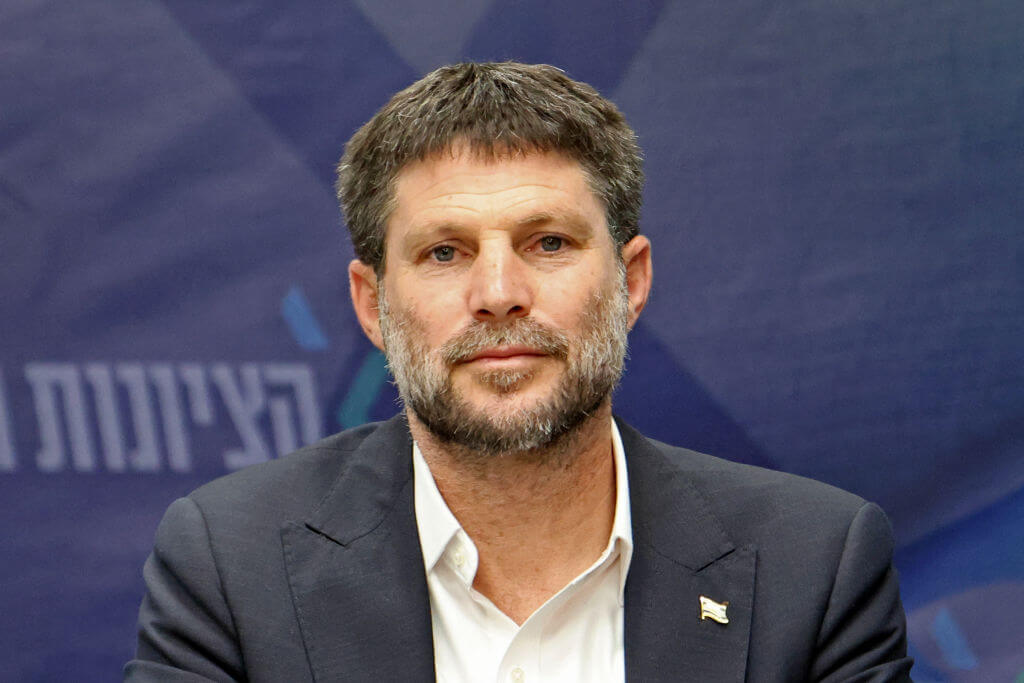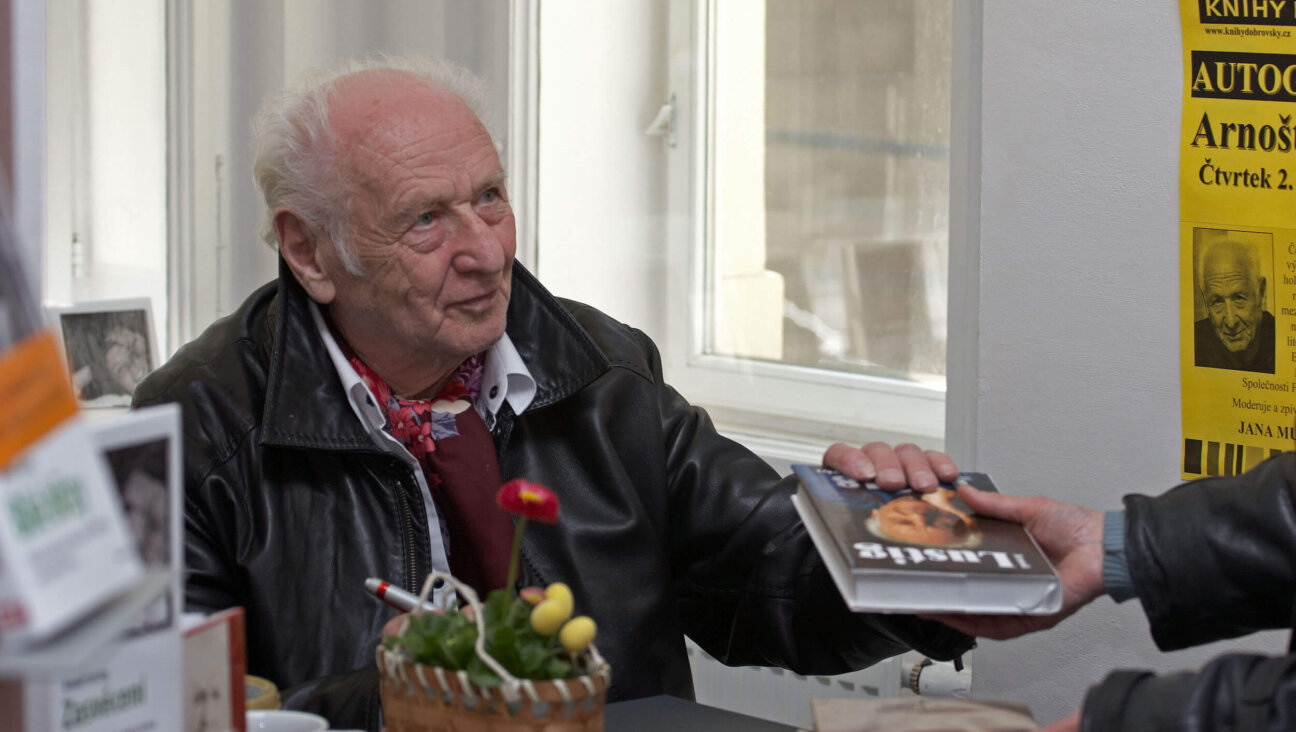Lots of Torah, less dialogue: Bezalel Smotrich’s plan to radically change Israel’s character
Israel’s Finance Minister, Bezalel Smotrich, claims to envision a country of ‘fraternal dialogue’ — but his actual aims are less conciliatory

Bezalel Smotrich, leader of the Religious Zionist Party and Israel’s Finance Minister, wants Israel to adopt Torah law. Photo by GIL COHEN-MAGEN/AFP via Getty Images
This story was produced by Shomrim, The Center for Media and Democracy in Israel, a Tel Aviv-based independent, nonprofit investigative news organization. Shomrim, which works in partnership with other news outlets, sees investigative reporting as an essential tool for promoting democratic discourse and accountability in Israel. Click here to see the original, Hebrew version.
Less than three weeks after Israel’s governing coalition revoked the High Court’s right to overturn laws it deems unreasonable — a decision the High Court is currently reviewing — the head of the far-right Religious Zionism party, Finance Minister Bezalel Smotrich, launched a new campaign called “Siah Ahim” — Hebrew for “fraternal dialogue.”
According to Smotrich, his party was “launching an operation to bring people together” using circles of dialogue in Israeli society. “It is time,” he explained, “to heal the wounds.”
Smotrich is a talented politician, whose every move is carefully considered. However, a thorough examination of his ideological credo — through articles he has written, his social media posts and interviews he has given since he was first elected to the Knesset in 2015 — shows that the main goal of his “outstretched hand” is to bring “the brothers” closer to him, not to find common ground with them.
Shomrim twice asked Eitan Fuld, Smotrich’s media adviser, to comment on the content of this article. He did not reply.
On secularism: Invest billions in religious schools
It is interesting to start examining Smotrich’s ideology with an opinion piece he wrote in Makor Rishon, a newspaper associated with Religious Zionism and the conservative right-wing, in November 2015, just a few months after he was elected to the 20th Knesset.
“My view of secularism is one of partnership, but absolutely not acceptance,” he wrote. “I aspire to create change, to always be influential. And for that I need to be connected, to touch, to be part of it. You cannot influence something without being connected to it.”
In a post to his Facebook page last summer — seven years after that article was published — Smotrich detailed the measures that would be needed for this in clear and simple terms: “The massive wave of progressive trolling that has been sweeping over the state-run education system could be the golden age of state-run education. Thanks to a campaign that explains to Israeli parents the simple truth: If you want to end up with shallow and confused children who have been brainwashed by the progressives, who have no national, personal or gender identity, who are devoid of values and disconnected from their Jewish identity and roots — send them to a secular state-run school; if you want to give your children a moral education with Jewish roots, and to end up with children who are connected to the identity and their people, healthy and stable, with a spine and national pride — send them to a state-religious school.”
‘This is the last time the High Court decides for us’
The combination of a messianic agenda and clear, catchy messages that work well on social media is one of Smotrich’s trademarks. Some of his comments have become part of the Israeli political vernacular. In particular, there was a recording of a conversation in which Smotrich called Prime Minister Benjamin Netanyahu a “liar and a son of a liar.” In the same conversation, Smotrich added that “Netanyahu is a problem, but you have to choose one problem or another.”
The issue of the judicial overhaul highlights one of the major differences between Smotrich and Netanyahu. Before the last election, the prime minister opted not to reveal to the public the full extent of the reforms he was planning on enacting in the Israeli judicial system. Smotrich, in contrast, put all of his cards on the table. All you had to do was listen to what he was saying.
In March 2019, a month or so before the election campaign that threw the Israeli political system into chaos and led to a series of caretaker governments, Smotrich wrote on his Facebook page: “With God’s help, in our next term of office, we will pass, among other things, the override clause and we will annul the reasonableness clause. We will restore the limitations on standing and we will remove left-wing organizations from the courts.” Three weeks later, he added: “Take note: This is the last time that the High Court of Justice will decide for us.”

The understanding that the right must take control of the judicial branch if it truly wants to rule has been part and parcel of Smotrich’s ideology for years. In a 2018 interview with Shimon Riklin and Erel Segal on Channel 20 (now Channel 14), an Israeli right-wing television channel, he stressed that “on the issue of the High Court, we will create a coalition crisis. Without that, we’re not in power.”
That same year, at a ceremony for Jerusalem Day, an Israeli national holiday celebrating the reunification of East and West Jerusalem following the 1967 Six-Day War, he declared, “We want the justice portfolio because we want ‘to restore our judges as in days of yore.’ We want to restore Torah law to its rightful place.”
These comments were greeted with a storm of protest, but when he was asked to clarify what he meant, Smotrich did not back down. “The religious public must stop being afraid to speak its truth and to promote it slowly and patiently.” Similarly, he has long spoken openly about his desire to expand the authority of the rabbinical courts and his aspiration for Israel to adopt laws as defined by Torah. In 2019, for example, he said in a radio interview with Israel’s public broadcaster that “Israel, with God’s help, will once again conduct itself as it did in the days of King David and King Solomon — according to Torah law, with, of course, adaptations to the modern age […] This is how things should be in a Jewish state.”
Democracy and constitution
The current position of the Religious Zionism party on how it sees democracy can be summarized by the phrase “majority rule,” as expressed by several members of the coalition, and by its aspiration to restrict the High Court’s ability to strike down laws that contradict one or more of Israel’s Basic Laws or the Knesset’s authority.
But a few years back it seems Smotrich had a different point of view. “In a democracy, there’s no such thing as the majority group meeting in some club and deciding to oust the minority group,” he said in a 2016 interview with Israel Hayom, a conservative-leaning Israeli newspaper owned by the family of Sheldon Adelson. “There’s no precedent for that. We live in a democratic country and an act like that is the opposite of democracy.”
A year earlier, in an article he wrote for Makor Rishon, he expanded on the issue, saying that “recognition of the limitations of democracy and the determination that the majority cannot do whatever it wants and cannot pass laws that contradict the constitution or the country’s basic values are very well suited to the system of a Torah regime … Our argument with the High Court is not over its actual legitimacy to overturn laws, but over the fundamental values upon which the constitutional examination is carried out.”
It seems, therefore, that overturning a Basic Law is both possible and legitimate according to Smotrich — as long as the values he holds dear are protected. A constitution, on the other hand, is not possible. In answer to a question posed by the Channel 12 website to the leaders of every political party in April 2019 — just as Israel was sliding toward political chaos — Smotrich said that “we cannot rely on High Court justices to act fairly with the constitution, after they proved that they used the language of the law and the basic laws like plasticine to shape their personal and political beliefs, while abusing their authority.”
In a television interview the same month, he continued to take a more conciliatory line. “I understand the fear … I am returning the power to the people,” he said. “Not through revolutions, not through misinformation and not in secret … We will carry out these changes while listening, in a measured manner and with a lot of respect and esteem for those who disagree with us.”
But just two months after that interview, when Amir Ohana, who was justice minister at the time, was roundly criticized for his assertion that not every High Court ruling must be obeyed, Smotrich backed him up, writing on the B’Sheva website — a religious right-wing newspaper and media outlet — “This is just a preview of what they will do when the time comes for the real corrections that we will have to make to the judicial system. If you like, it’s a kind of dry run before the real thing.”
‘Save the IDF, don’t join up’
The resignations of some IDF reservists and demonstrators taking the tactic of blocking roads are the two hottest potatoes in the Israeli public discourse over the past eight months. It is worth examining Smotrich’s comments on the matter, but, before we do so, we should recall the role that he played in right-wing protests against the disengagement from the Gaza Strip in summer 2005.
At the time, Smotrich was recorded standing alongside a friend, who said, “the country has to rise up, and then people will understand that the ground is burning beneath their feet.” Smotrich then added, “this is a small taste of what will happen for months upon months.”

Most of the media coverage of Smotrich at the time of the disengagement has focused on his arrest by the Shin Bet, which held him for three weeks while Israeli forces and settlers were leaving Gaza. Recently, Smotrich lambasted News 12 journalist Guy Peleg, threatening to sue anyone who claimed that when he was apprehended, he was in possession of a large quantity of gasoline.
Indeed, Smotrich was not arrested with a jerry can of fuel in his hand, but, according to a Globes report from July 2005, he was arrested alongside four other far-right activists on suspicion of organizing road blockades.
According to the report, when authorities searched the home of one of the detainees, they found maps, flammable materials and gasoline — supplies investigators suspected were intended to be used in public disturbances. The same report claimed that Smotrich and his friends were also thought to be connected to an incident in which nails and oil were poured onto the main Jerusalem-Tel Aviv highway, and were under suspicion for damaging telecommunications equipment in central Israel, vandalizing government offices and locking schools.
Smotrich and his friends refused to talk during their questioning by the Shin Bet, and were eventually released to house arrest. None of them were ever charged. “In order to present evidence that would lead to a conviction,” Shin Bet investigator Dvir Kariv told News 12 in November 2022, “we would have had to reveal things that the service did not want to reveal. As far as we are concerned, we can say with satisfaction that the things they were planning to do did not happen. They would have created massive chaos in the country.”
Smotrich laid out his view of refusal to serve in the IDF at length in an article he wrote in 2017 for the B’Sheva website. Editors gave the article the headline, “Save the IDF, don’t join up.” In it, Smotrich called on Israelis to refuse to serve in the IDF following a ruling that paved the way for men and women to serve together, which he said created “a twisted and dangerous value system … which relegates values like professionalism and the aspiration to win,” adding that “Mixed service is taking something so absurd that, if someone had suggested it not long ago, they would have been locked up in a psychiatric hospital, and turning it into one of the IDF’s most prized values, alongside other new values, such as mixed-gender units.”
In the same article, he also called for people to refuse to serve because the IDF changed the name of one of its officials from “Special Advisor to the Chief of Staff on Women’s Affairs” to “Special Advisor to the Chief of Staff on Gender Affairs.”
Women’s and LGBTQ+ rights
In a 2018 interview with The Liberal magazine, Smotrich said quite clearly: “I oppose women serving in the IDF. That is the position of the rabbinate and I am bound by that. Any woman who wants to join the army — good luck to her. If a girl were to ask me, I would tell her ‘Get married and have a lot of children for Israel’s sake.’ But if she insisted, I would recommend that she go to national service and not the army.”
After the Air Force appointed its first female pilot that same year, Smotrich said, in an interview with Israel’s public broadcaster, that “there are some professions and roles in life that are suited to men and there are those suited to women. That is how the Lord Almighty created the world, that is what is good for the world — and woe betide us if all the women turn into men or vice versa.”
When it comes to violence against women and legislation proposed to tackle it, Smotrich wrote the following social media post in 2020: “The law will become a tool in the hands of progressive, leftist judges — and, unfortunately, there are plenty of them — in order to reeducate ‘benighted and antiquated societies’ and to ‘help them establish enlightened families.’ They will see every situation as representing inequality or not 100 percent in line with their perception of the family — in total disconnect from moral, cultural and emotional questions — that justifies crude intervention … There is no absurd idea that the judiciary refused to embrace. I will not entrust it with shaping the Israeli family.”
On the issue of LGBTQ+ rights, Smotrich has declared himself to be “a proud homophobe” — even if he subsequently retracted, saying that he did not understand the full meaning of the word. The chairman of the Religious Zionism party was among the organizers of the March of Courage and Humility — also known as the Beasts March — which was held in 2006, when, accompanied by donkeys and dogs, marchers protested against a Pride Parade being held in Jerusalem.
His comments in subsequent years showed that he views the LGBTQ+ community as abnormal. “The inclination is not verboten,” he wrote on social media in 2018, “but acting on it is extremely grave … Compare the struggle of people with opposite tendencies to the struggle of people with disabilities. Imagine if the disabled were to demand that everyone cut off their own leg, so that they don’t feel uncomfortable with their difference. That is exactly what the LGBTQ+ want to do. They find it hard to be the exception, so they seek to undermine the concept of ‘norms’ in the family and in relationships … And that, my friends, is our national problem. This group is challenging all of life’s norms just so they can feel normal with their abnormality.”
In an interview with The Liberal that same year, he added: “I respect and love the LGBTQ+ community, I understand their difficulties and I want to help them. They find it hard. The suicide rate among them is high. They really are unfortunate. I believe in the normative family unit … and they want recognition. Legitimacy. I cannot agree to that. As long as it is up to me, there will be no recognition of same-sex marriages. It is not right and it is not healthy.”

The conflict with the Palestinians
In a 2017 article on the Israeli-Palestinian conflict Smotrich wrote for the Israeli journal Hashiloach, he presented what he called his “Decisive Victory Plan.” In it, he wrote that “terror stems from the hope to weaken us,” therefore “any solution must be based on eradicating their aspiration to fulfill their national Arab goal between the Jordan and the [Mediterranean] Sea … It will take time, especially because, in our stupidity, we nurtured within the Arabs the illusion that they can establish a state here.
Other slogans that Smotrich employs liberally include: “There’s no such thing as the ‘two-state solution’” and “The Land of Israel is ours, so we cannot have stolen it.” Another of Smotrich’s slogans specifically highlights his desire for a single state or for the transfer of Arabs from the Land of Israel. In 2015, in a speech to the Knesset, he said: “There is just one state here, a Jewish state, and a Palestinian state will never be established alongside it. Anyone who wants to live with us — ahlan wa sahlan,” which means “welcome” in Arabic.
“Anyone who doesn’t,” he said, “should either leave or we will see them in the sights of our guns.”
A year later, he tweeted: “All that remains now is to go from talk to action: Turn out the light in the Palestinian Authority, impose [Israeli] sovereignty and do what any self-respecting country would have done long ago.”
Also on Twitter, he called Ta’al (a secular Arab-Israeli political party) chairman Ahmad Tibi, who has served in the Knesset since 1999, “a representative of a fictitious, non-existent people.”
Understanding the principles of Smotrich’s plan makes his more recent statements, especially those about the Palestinian village of Hawara, even more stark. Following the 2023 murder of two Israeli brothers — Hillel and Yagel Yaniv — in a terror attack, Smotrich, speaking at a conference organized by financial newspaper The Marker, said, “I think the village of Hawara needs to be erased. I think that the state of Israel needs to do it. God forbid that private individuals should do it.” Smotrich also liked a tweet by the deputy head of the Samaria Regional Council, David Ben-Zion, who — just hours before the settler riot in Hawara — said that “the village of Hawara should be erased today … There is no room for mercy.” (Ben-Zion’s tweet was subsequently deleted.)
Smotrich’s comments on Hawara were roundly condemned by the U.S. State Department, and officials in the American administration boycotted his visit to the United States shortly thereafter. Smotrich, for his part, rushed to the studio of Israeli Channel 12’s television program, Meet the Press, where he engaged in frantic damage limitation: “If anyone is capable of ascribing to me the actual intention of wiping out the village — that is a product of their own sick minds,” he said. “My intention is that we need to be more proactive and aggressive in the battle against terror because people are being murdered here. It may well be that, in the heat of the emotion, things were said and I misspoke.”
But Smotrich did not exactly misspeak. He used the word “erase” to refer to proposed actions against Palestinians as far back as March 2019, when missiles were fired from the Gaza Strip at Tel Aviv. “I wanted to write that Netanyahu must erase 20 Hamas buildings in Gaza tonight,” he posted on social media. “I wanted to write that this is the way to restore deterrence. But then I stopped because this is what should have been done when missiles were fired at the South. So, he should only flatten 20 buildings tonight on condition that he promises that, from now on, what’s good for Sderot is good for Tel Aviv.”
Smotrich also advocates for harsh IDF tactics. “Share and spread the true military ethics,” he said in the Knesset in February 2016. “A terrorist, no matter how old he is, who sets out to kill a Jew just for being a Jew does not return home alive. Period. That is the ABC of morality.”
When Palestinian teenager Ahed Tamimi was arrested for slapping an IDF soldier at Nabi Saleh in March 2018, Smotrich tweeted: “I am actually very sad that she’s under arrest. I think she should have taken a bullet, at least to the kneecap. That would have put her under house arrest for the rest of her life.” In response to that comment, Smotrich’s Twitter account was suspended for 12 hours.
Racism
“You are here by mistake, because Ben Gurion did not get the job done and didn’t drive you out in 1948.”
That, it seems, is probably the most famous racist comment to come from the mouth of the chairman of the Religious Zionism party, which he uttered from the podium in the Knesset in October 2021. He also took that opportunity to call Arab members of the Knesset “supporters of terror” and “enemies,” adding that he has nothing to talk to them about.
On another occasion, he told journalists that “the Arabs are Israeli citizens — for now — and they have representatives in the Knesset — for now.”
A year later, in September 2022, at a conference of the International Institute for Counter-Terrorism at Reichman University in Herzliya, Israel, Smotrich said that “the most dangerous threat today is the one being posed by nationalists in the Israeli Arab community. As the first step in response to this, it is time to outlaw the Arab parties currently serving the Knesset and their representatives.”
Smotrich’s racism also comes to the fore in his aversion to Arabs in civilian life. Among his more outrageous comments was one in April 2016, when he came out in support of the segregation of Jewish and Arab women in maternity wards. “My wife is no racist,” he tweeted, “but after giving birth she wants rest and not the loud parties that are customary among the families of Arab mothers. It’s natural that my wife does not want to be in a bed next to a woman who just gave birth to a baby that could end up murdering her baby in 20 years. That’s the most natural and normal thing in the world.”
During a Knesset committee in October 2016, Smotrich had this to say about Arab students: “They do not have to take the psychometric test to get into university because of affirmative action. Illiterate Arabs are taking the place of Jews. Show me one Arab who passed the psychometric test before being accepted to university.”

Economics and science
Smotrich views himself as loyal to the spirit of true Judaism, and that, it seems, also has something to say about science and economics. When he was appointed finance minister at the start of this year, Smotrich gave an interview to the Haredi magazine Mishpacha in which he explained that his economic credo is based on the quote from the Book of Leviticus, which states that “if you follow His laws,” God will provide.
“They tried a lot of economic theories. They tried capitalism, they tried socialism, but there’s one thing they haven’t tried: an economic approach known as ‘If it be Your will,’” Smotrich said. “If we uphold the Torah, will we enjoy economic bounty and great blessings.” Such opinions, it seems, have characterized Smotrich since the start of his political career — long before he was put in charge of Israel’s economy. In a December 2015 conversation with Arutz Sheva, a media group started by the wife of one of Religious Zionism’s founders, Smotrich was asked about the National Insurance Institute’s annual poverty report, which found that one in three Israeli children was living under the poverty line. In response, he said: “Those figures are inflated. I have five children and I don’t think that two of them are poor.”
In 2017 — also in an interview with Arutz Sheva — Smotrich said that he prefers the Torah to science. “We were created by God,” he said. “It’s a lot more delusional to think that everything was created by the Big Bang. It’s a lot more bizarre to think that we came from monkeys. Darwin’s theory is already passé and the theory of evolution is also no longer accepted in the scientific world.” (98% of American scientists believe in evolution, according to Pew research.)
Perspectives on the non-Orthodox
Over the years, Smotrich has also had plenty to say about the relationship between Israel and the Jewish Diaspora, as well as the standing of Reform Judaism in Israel.
Smotrich, who comes from the Orthodox stream of Judaism, has consistently shown disdain for Reform Judaism. While the Reform Judaism movement is growing in Israel, in 2017, following the suspension of a plan that would allow for mixed-gender prayer services at a sectioned-off area adjacent to the Western Wall, Smotrich wrote: “As long as there is a fraction of a thousandth of one percent of Reform Jews in Israel, compared to the vast majority of Orthodox Jews — and, yes, even secular Jews in Israel are Orthodox secular — it is obvious that there should be no room for a public space adapted to the Reform approach. It makes no sense whatsoever. That’s not how democracy works. If American Jews immigrated to Israel and there were three million reform Jews here, there would be something to discuss. In the meantime, we’re not there.”
Smotrich has also worked to try to remove the grandfather clause from Israel’s Law of Return, which allows anyone with one Jewish grandparent to obtain Israeli citizenship, even if they are not considered Jewish according to the Law of Return or Jewish law. In a radio interview, he explained that “this is one of the greatest threats to the Israeli demography, to the Jewish character of the state and to assimilation.”















